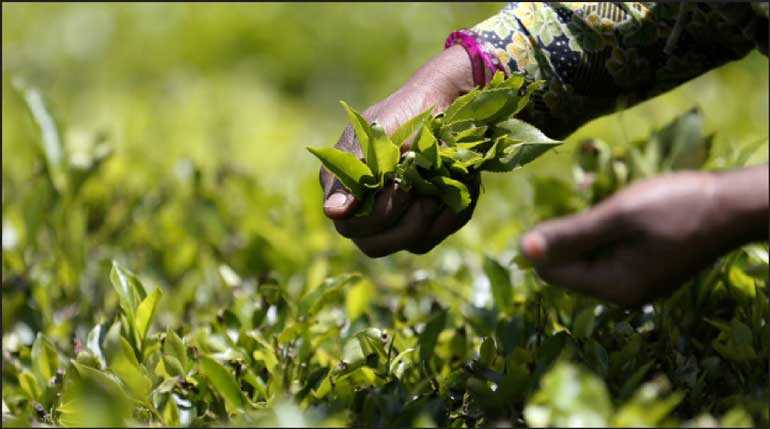Thursday Feb 19, 2026
Thursday Feb 19, 2026
Thursday, 14 May 2020 00:00 - - {{hitsCtrl.values.hits}}

Panic buying triggered by the spread and impact of the novel coronavirus (COVID-19) pandemic along with short supply has boosted prices at Colombo tea auctions bringing cheer to the industry and the beleaguered Sri Lankan economy.
The national Tea Sales Average (TSA) for the month of April totalled Rs. 689.18 per kilo, the highest-ever recorded for a calendar month surpassing the previous best of Rs. 648.52 achieved in April 2017, according to Forbes and Walker Tea Brokers.
When compared with the TSA of Rs. 595.22 per kilo in March, the April figure reflects a significant increase of Rs. 93.96. Forbes and Walker said it is the highest recorded gain month on month. In comparison to a year ago, the 2020 April figure reflects a Rs. 110.95 per kilo gain.
The dealer prices are comforting for the tea industry which is concerned with a drop in the oil market, which reached a record low in April – the steepest monthly drop since the global financial crisis in 2008/9. “No doubt concerning as Sri Lanka tea exports, to a great extent, are reliant on oil rich countries,” Forbes and Walker Tea Brokers said.
However it said the current short supply and tight inventories of importers following panic buying by consumers in most countries had resulted in a high demand for tea for immediate shipments.
“This would no doubt augur well for tea prices in the short to medium term. In this context, producers should strive to achieve high standards of quality and avoid flooding the market with a surfeit of poor quality teas, particularly as we observe a significant increase in tea production from the African Region,” Forbes and Walker Tea Brokers said.
Commenting on the elevational averages in April, the broker said High Growns totalling Rs. 638.95 per kilo was an increase of Rs. 78.85 month on month and up Rs. 97.98 YOY. Mediums averaging Rs. 612.72 for April was an increase of Rs. 72.65 vis-à-vis Rs. 540.07 of March and Rs. 508.14 in 2019 reflecting a significant increase of Rs. 104.58.
Forbes and Walker also said the highest-ever Low Grown average for a month totalling Rs. 739.82 was recorded in April surpassing the previous best of Rs. 668.58 recorded in May 2017. When compared to Rs. 625.78 of March, it shows a significant increase of Rs. 114.04. Meanwhile, it also shows a significant increase of Rs. 131.75 YOY when compared to Rs. 608.07 of April 2019.
When analysing the January-April cumulative average of Rs. 618.17, an increase of Rs. 34.62 is recorded vis-à-vis Rs. 583.55 of January-April 2019.
High Growns for the period January-April of Rs. 577.72 have shown an increase of Rs. 12.03 vis-à-vis Rs. 565.69 of January-April 2019. Mediums averaging Rs. 547.11 have shown an increase of Rs. 36.85 vis-à-vis Rs. 510.26 of January-April 2019. Meanwhile, Low Growns totalling Rs. 653.48 for January-April have shown the highest increase of Rs. 44.83 vis-à-vis Rs. 608.65 of January-April 2019.
“The monthly averages show an increase when analysed in dollar terms even with the depreciation of the rupee during the month, whilst cumulative averages do not show a significant variance,” Forbes and Walker Tea Brokers added.
Last week the Sale No. 17 was a one day restricted sale owing to the intervening Vesak holidays. Consequently, total auction offerings were limited to 3.2 million kilos. Forbes said there was less demand and prices were mostly firm to easier, perhaps on account of the limited number of working days in the week.
The weekly auction which commenced on 6 May on the recently developed ePlatform encountered some technical issues, which delayed the commencement of the sale that was scheduled for 7.30 a.m. Consequently, Sale No. 17 was concluded on 9 May.
“It is heartening to witness the 150-year-old tea industry continuing to show resilience with commercial activity being carried out at near normal levels. In the backdrop of the 21 April 2019 attacks, Sri Lanka recorded its lowest growth for 18 years with an economic growth of only 2.3%,” Forbes and Walker Tea Brokers said.
Further, due to the COVID-19 pandemic, the growth outlook is expected to contract further in 2020 with the rupee depreciating by 6%-8% against the dollar, it added.